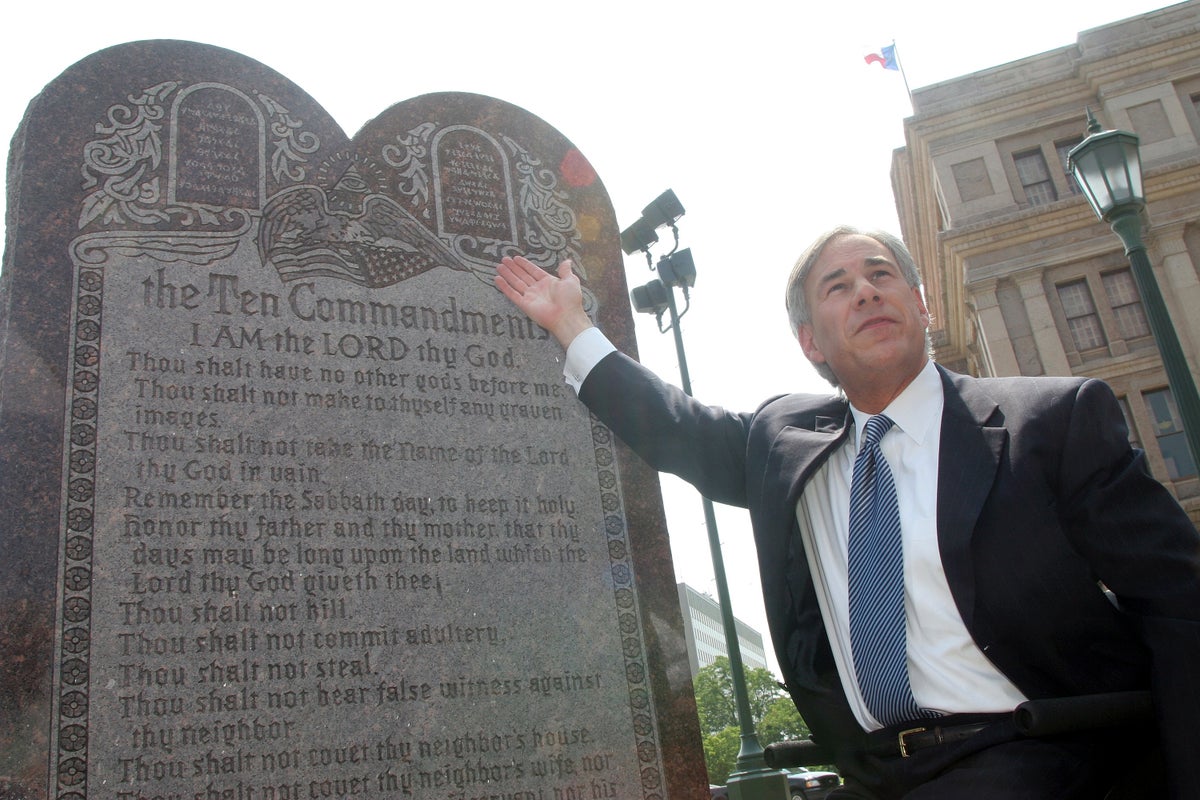
A federal judge in Texas has temporarily blocked state law requiring the Ten Commandments in every public school classroom, setting up a possible Supreme Court showdown after several Republican-led states have tried, and failed, to implement similar laws.
The Texas law, which was set to take effect September 1, likely violates the First Amendment’s prohibitions against government interference and endorsement of religion, according to Tuesday’s order from District Judge Fred Biery.
His colorful 55-page ruling quotes from Sonny & Cher, Greta Garbo and Kurt Vonnegut as well as Supreme Court rulings, historians and prominent faith leaders, from Billy Graham and Pat Robertson to the Buddha.
“Ultimately, in matters of conscience, faith, beliefs and the soul, most people are Garbo-esque,” he wrote, referencing her line “I want to be alone” from the film Grand Hotel. “They just want to be left alone, neither proselytized nor ostracized, including what occurs to their children in government-run schools.”
Texas Attorney General Ken Paxton will appeal, his office told The Independent.
Under legislation approved by Texas lawmakers and signed into law by Governor Greg Abbott earlier this year, all public elementary or secondary schools must “display in a conspicuous place in each classroom of the school a durable poster or framed copy of the Ten Commandments.”
A lawsuit was filed by a group of Texas families with Christian, Jewish, Hindu, Unitarian Universalist, and nonreligious backgrounds, including clergy, with children in public schools.
The judge agreed with plaintiffs that those displays “are likely to pressure” children “into religious observance, meditation on, veneration, and adoption” of the state’s favored religious doctrine while “suppressing expression of their own religious or nonreligious background and beliefs,” according to the judge.
Biety also agreed that “these matters of individual conscience and the soul should be free of government interference and coercion.”
The Ten Commandment won’t necessarily be taught in schools, but “the captive audience of students likely would have questions, which teachers would feel compelled to answer,” according to the judge.
“Teenage boys, being the curious hormonally driven creatures they are, might ask: ‘Mrs. Walker, I know about lying and I love my parents, but how do I do adultery?’” the judge wrote. “Truly an awkward moment for overworked and underpaid educators, who already have to deal with sex education issues … and a classic example of the law of unintended consequences in legislative edicts.”
Biety’s ruling — which traces the history of religious observation and persecution— asks whether that “violent history gives rise to the question: ‘Haven’t we evolved?’’”
“Other than size and longevity, the answer clearly is: ‘Of course not,’” he wrote, adding “The Beat Goes On” — with a footnote referencing the song from Sonny & Cher.
He notes that “those who immigrated to Texas were neither the first nor the last group to come to America in search of freedom from government-controlled religion,” pointing to a long line of state-imposed persecution. “So it goes,” he wrote — with another footnote referencing Vonnegut’s Slaughterhouse-Five.
Rabbi Mara Nathan, the lead plaintiff in the case, said in a statement that “children’s religious beliefs should be instilled by parents and faith communities, not politicians and public schools.”
Heather L. Weaver, senior counsel for the ACLU’s Program on Freedom of Religion and Belief, said the ruling “ensures that our clients’ schools will remain spaces where all students, regardless of their faith, feel welcomed and can learn without worrying that they do not live up to the state’s preferred religious beliefs.”
In his conclusion, the judge offered an olive branch to his critics.
“For those who disagree with the Court’s decision and who would do so with threats, vulgarities and violence, Grace and Peace unto you,” he wrote. “May humankind of all faiths, beliefs and non-beliefs be reconciled one to another. Amen.”
In a statement to The Independent, Texas Attorney General Ken Paxton said “the Ten Commandments are a cornerstone of our moral and legal heritage, and their presence in classrooms serves as a reminder of the values that guide responsible citizenship.”
“Texas will always defend our right to uphold the foundational principles that have built this nation, and I will absolutely be appealing this flawed decision,” he added.
Lawmakers in Arkansas have advanced similar legislation, and Oklahoma’s chief school officials mandated copies of the Bible and Ten Commandments in all classrooms with “immediate and strict compliance.”
Last year, District Judge John Wheadon deGravelles paused a similar Louisiana law that had swiftly drawn legal challenges from civil rights groups anticipating a Supreme Court battle.
Legislation to incorporate Christian teachings in public schools joins a nationwide effort from conservative special interest groups to move public funds into religious education, dovetailing with efforts by Donald Trump’s administration and across the country to let families use taxpayer funds to send their children to private schools.
Earlier this year, the Supreme Court reached a surprise tie in a case that could decide whether Oklahoma could open the first-ever taxpayer funded Catholic public charter school, which triggered a high-profile legal battle to decide whether public funds can be used to create religious schools — setting up a major test to the First Amendment’s establishment clause.
The 4-4 decision, from which Justice Amy Coney Barrett recused herself, upheld a lower-court ruling that effectively blocked the school’s opening — for now.
